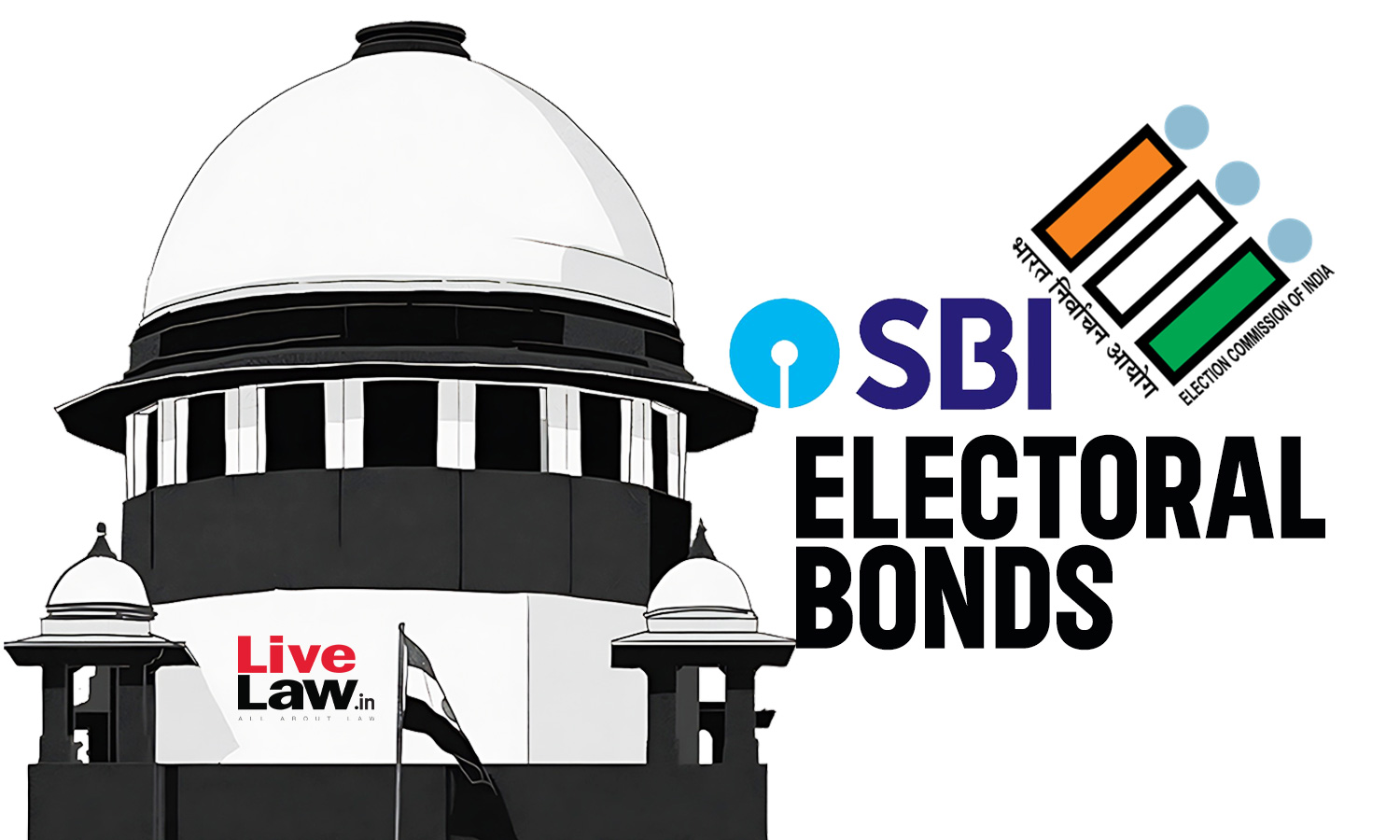[ad_1]
Within the newest growth within the electoral bonds case, the Supreme Court docket on Monday (March 18) requested the State Financial institution of India (SBI) to reveal all ‘conceivable’ particulars accessible with it concerning electoral bonds, together with the alphanumeric quantity corresponding to every bond. It pronounced –
“…There isn’t a method of doubt that the SBI is required to furnish all particulars accessible with it. This, we make clear, will embody the alphanumeric quantity and serial quantity, if any, of the bonds bought. With the intention to keep away from any controversy sooner or later, the chairperson of the financial institution ought to file an affidavit by 5 PM on Thursday that it has disclosed all particulars in its custody and that no particulars have been withheld.”
The Court docket acknowledged that its February 15 judgment mandated the SBI to reveal “all particulars” together with the date of buy/redemption, identify of purchaser/recipient, and the denomination. The usage of the phrase “together with” signifies that the main points specified within the judgment are ilustrative and never exhaustive.
The Court docket additional directed that the Election Fee of India ought to add on its web site the main points obtained from the SBI forthwith upon their receipt.
This marks a big step within the court-mandated disclosure course of regarding electoral bond particulars, which stems from a constitution bench ruling placing down the electoral bonds scheme as unconstitutional. Beforehand, the apex courtroom dismissed an application by the financial institution for an extension of time to furnish electoral bonds particulars.
Following the courtroom’s rebuke, the State Financial institution furnished the details of electoral bonds to the Election Fee of India (ECI) in compliance with its directives. The main points had been offered in two separate data packets – the primary containing particulars of the purchasers of the electoral bonds, and the second containing names of the political events who’ve encashed these bonds with all of the requisite particulars.
Final week, a bench of Chief Justice DY Chandrachud, and Justices Sanjiv Khanna, BR Gavai, JB Pardiwala, and Manoj Misra reconvened to listen to an software filed by the Election Fee of India. The fee sought the return of sealed envelopes containing electoral bond particulars furnished beforehand to the apex courtroom, stating that it didn’t retain copies to keep up confidentiality. In response to this, the bench instructed the registrar normal to make sure the scanning and digitisation of the information by 5 PM on Saturday, after which the unique copy was directed be returned to the Election Fee. The digitised recordsdata was additionally made accessible to them in order that the information could possibly be uploaded on the fee’s web site.
Crucially, throughout final week’s listening to, the five-judge bench harassed the necessity for the State Financial institution of India (SBI) to reveal the alphanumeric quantity corresponding to every electoral bond, together with the main points it has already disclosed concerning the acquisition and redemption of the bonds. Accordingly, it issued discover to the SBI and directed the matter to be posted for listening to on Monday, March 18.
Disclosure of ‘all particulars’ imply disclosure of bond numbers too: Supreme Court docket
Chief Justice Chandrachud emphasised the scope of disclosure required saying, “Within the judgment, we had expressed requested the State Financial institution of India to reveal ‘all particulars.’ That features the bond numbers as nicely. The financial institution can’t be selective in disclosing all particulars. Don’t watch for the orders of this courtroom.”
“If the numbers are to be given, we’ll give them. That is no downside,” Senior Advocate Harish Salve, representing the State Financial institution of India, admitted. He defended the financial institution by saying that the present standing of the disclosure on the premise of its understanding of the courtroom’s interim directive in April 2019.
To this, the chief justice reiterated, “After we say ‘all particulars,’ it consists of all conceivable knowledge. This interim order has merged with our remaining judgment. We are going to make clear that and say that the State Financial institution of India won’t solely file the bond numbers but in addition ask it so submit an affidavit saying that it has not suppressed any particulars. The onus shouldn’t be on the courtroom.”
In the course of the courtroom alternate, Senior Advocate Mukul Rohatgi, representing FICCI and ASSOCHAM, sought to deal with the courtroom in an try to persuade them to defer the disclosure of the bond numbers. Nevertheless, Chief Justice DY Chandrachud responded, “Now we have no such software on board.”
When Rohatgi sought to press his software on behalf of industrialists, questioning how the data might be requested to be disclosed when there was a assure of anonymity, Chief Justice Chandrachud replied, “Mr Rohatgi, there is just one reply. With impact from April 12, 2019, we directed the gathering of particulars. Everybody was placed on discover on the time. For this reason we didn’t ask the disclosure of the bonds offered previous to this interim order. This was a aware alternative by this structure bench.”
Courts shoulder broad sufficient to cope with social media commentary: Supreme Court docket
The courtroom was additionally addressed by Solicitor Basic Tushar Mehta, who highlighted the challenges posed by social media commentary on the courtroom’s judgment. He expressed considerations in regards to the misuse of statistics and the potential for misinformation –
“How this courtroom’s judgment is enjoying out is one thing which it should be knowledgeable of…Now the witch-hunting has began at another degree, not on the government-level. These earlier than the courtroom have began giving press interviews intentionally embarrassing the courtroom. A barrage of social media posts meant to trigger embarrassment has began. Statistics might be twisted in any method. Primarily based upon twisted statistics, every kind of posts are made. Would your lordships contemplate issuing a route…”
Nevertheless, Chief Justice Chandrachud reassured that the courtroom was ready to deal with social media commentary, stating, “As an establishment, our shoulders are broad sufficient to cope with social media commentary. Our intent was disclosure…We’re ruled by a rule of legislation.”
Directing disclosure of bond particulars between courtroom’s interim order and remaining judgment was a aware choice: Supreme Court docket
In a associated growth, the ‘Residents Rights Belief’ has filed an application within the Supreme Court docket searching for the disclosure of the main points of electoral bonds offered between March 1, 2018 and April 11, 2019, together with the alphanumeric quantity, date of buy, denomination, and names of donors and political events. It has claimed {that a} whole of 9,159 bonds value Rs 4,000 crores was offered on this interval.
Presently, the Supreme Court docket has solely directed the State Financial institution of India to reveal data regarding bonds offered for the reason that courtroom’s interim order on April 12, 2019 till the date on which it declared the scheme unconstitutional on February 15.
Throughout immediately’s listening to, the Chief Justice Chandrachud-led bench responded to this software, emphasising that making the directive for disclosure relevant from April 12, 2019 was a aware alternative by the structure bench. The chief justice clarified the courtroom’s stance as soon as once more, when some legal professionals, together with Advocate Prashant Bhushan, urged the courtroom to direct the disclosure of electoral bond particulars from the inception of the federal government’s scheme.
“In our judgment, we’ve got taken a aware choice that the deadline must be date of interim order (April 12, 2019). We took that date as a result of it was our thought-about view that when that interim order was pronounced, all people was placed on discover. If we’ve got to return to earlier date, it it’ll change into a substantive modification of the judgment and would require a evaluation of this judgment. This can’t be executed in a miscellaneous software.”
To this, Senior Advocate Vijay Hansaria replied, “Logically, as soon as the fitting to know of voter, it must be from the start. But when Your Lordships have taken a aware choice, I’m not urgent it.”
When Bhushan continued his impassioned plea, Solicitor Basic Mehta interjected, “Sufficient of help by these ‘public spirited residents’. He’s gathering the main points for a future public curiosity litigation.”
Finally, the bench dismissed this software as non-maintainable, recording that it sought a substantive modification of the structure bench ruling.
In a landmark judgment, the Chief Justice Chandrachud-led bench on February 15 struck down the electoral bonds scheme holding that nameless electoral bonds contravene the fitting to data beneath Article 19(1)(a) of the Structure.
Not solely this, the State Financial institution of India, the issuing financial institution of electoral bonds, was directed by this structure bench to stop issuing these bonds instantly. Moreover, the financial institution was instructed to submit particulars of all such bond purchases made for the reason that courtroom’s interim order on April 12, 2019, to the Election Fee of India inside three weeks, setting the deadline for March 6, 2024.
Days earlier than the deadline was set to run out, the State Financial institution of India moved an application searching for an extension of time. Following this, varied events, together with Affiliation for Democratic Reforms (ADR), Widespread Trigger, and the Communist Social gathering of India (Marxist), filed contempt petitions in opposition to it for its non-disclosure of important particulars associated to electoral bonds.
SBI’s software was dismissed by the five-judge bench, which concluded that the requisite data was available with the financial institution, and rejected makes an attempt by the issuing financial institution to get the deadline prolonged on grounds of the complexity of compiling the information. Accordingly, the courtroom mandated the disclosure of those particulars by the shut of enterprise hours on March 12, 2024.
Following this directive, the SBI, on March 12, furnished the electoral bonds particulars to the Election Fee of India in compliance with the courtroom’s order. The ECI promptly announced this growth through its spokesperson on the social media platform ‘X’ (previously Twitter).
Moreover, on March 13, 2024, the Chairman of the State Financial institution of India, Dinesh Kumar Khara, filed a compliance affidavit with the Supreme Court docket, affirming the submission of electoral bonds particulars to the ECI. The affidavit outlined that the financial institution offered the data in two separate packets: one containing particulars of bond purchasers and the opposite containing data on political events redeeming these bonds. Moreover, the SBI clarified that between April 1, 2019, and February 15, 2024, a complete of twenty-two,217 bonds had been bought, whereas 22,030 bonds had been redeemed throughout this era.
In a subsequent transfer, on March 14, the Election Fee of India uploaded the electoral bonds knowledge equipped by the State Financial institution of India on its official web site, adhering to the courtroom’s directives for transparency. On Saturday, the Supreme Court docket, in response to its software, returned the sealed envelopes containing the information obtained from political events on electoral bonds, together with a digitised model. Following this, the fee uploaded on its web site the digitised knowledge obtained from the courtroom’s registry, announcing this development in a press launch.
Case Particulars
Affiliation for Democratic Reforms & Anr. v. Union of India & Ors. | Diary No. 11805 of 2024
[ad_2]
Source link





